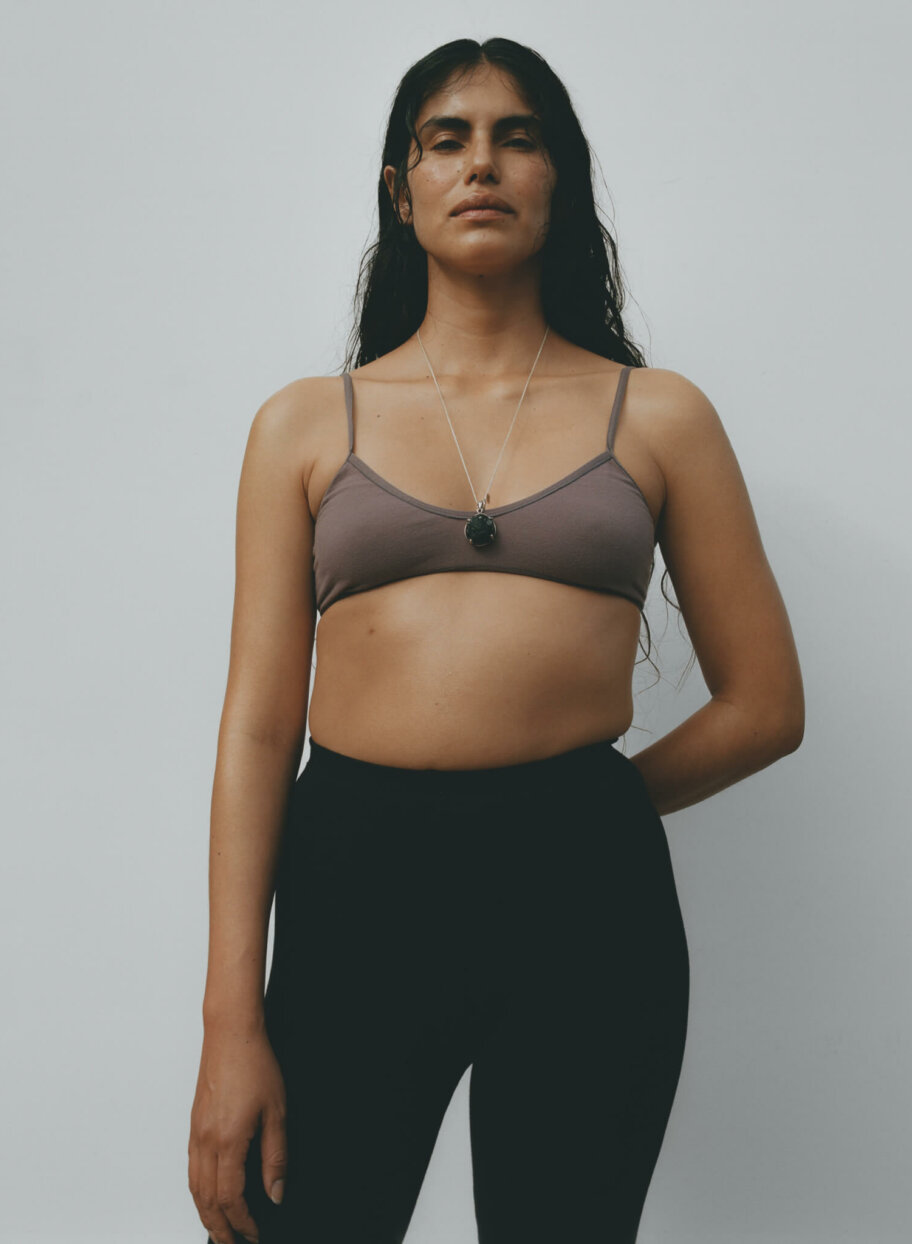
PHOTOGRAPHER WARD & KWESKIN @supervision_agency @wardkweskin
INTERVIEW BECK DIAZ @hypebeck
CASTING MARIA OSADO @mariaosadoo STYLIST KAROLYN PHO @karolynpho using only vintage and sustainable designers
HAIR RACHEL LEE WRIGHT@_uncle__lee_ @maworldgroup
MAKEUP ZENIA JAEGER @makeupbyzeniajeager @streetersagency. MODELS SOPHIA @casatigreblanco / ALYSSA VILLA @llorarygritar / ANDREA GALDAMEZ @amez_pro / JHEYDA MCGARREL @jheydamc / MAYA SALINAS @m4yasalinas / KARINA GARCIA @wickeddgirl / EMILY & ISABELLA @belladlt @_stillno.1
PHOTO ASSISTANT DAVID WINTHROP
I’m sitting on my parents bathroom floor in Florida, set to speak with Maria Osado, the casting director from Mexico and founder of Guerxs, an online talent agency. The phone rings and a man’s voice sounds from the other end. Apparently I got the wrong number. When I finally reach her, I learn that she’s not as far as I thought. “I haven’t told anyone this yet, but I’m actually living in NYC now and have been for six months”.
She says she’s living in Bedstuy with her partner, and tells me that it’s snowing. “It’s been a crazy year and it’s taken me a minute to settle and finally be able to say it, but I’m planning to stay here for a few years”. When I ask what prompted such a big move during such a tumultuous and uncertain time, you can hear everything in her voice. The certainty in her decision, and joy to be in a new place, but also a hint of loss for her hometown and fear of a perceived betrayal. “I was trying to expand my work as a casting director in the agency in Mexico as well. But the work that I want to do is really hard to do there” Maria’s agency is virtually run, and she casts mostly Mexico City based talent, but street casting in her city is not easy or necessarily safe, and Mexican-based brands are hesitant to work with her.
“Street casting is a term I took from other agencies, but I mostly cast digitally now because approaching people on the street in Mexico is very different than over here. People in the US are kind of aware that there are agents in the street who cast models and they don’t get super freaked out if someone comes up to them. In Mexico, especially as a woman, insecurity is super high. There’s a lot of danger just being a woman in public areas. So, while I had street casted, I noticed there was a lot of fear. Parties and the internet were the best places to cast. I was doing something that I had no idea how to do, so I had to be able to trust these people, and they had to be able to trust me. There are the people who don’t care about modeling, and then there are the people who don’t think they can do it because they haven’t been represented. The underrepresented are the people I want, but because they had never seen themselves in media, they honestly thought I was trying to scam them. That’s when everything became more digital. I would post on my Instagram for casting calls and people would come to certain locations. The problem with that was that it was only reaching a certain audience-people with internet, or people who followed me, or people who followed the people that followed me- so it was very limiting. At this point in my life, I don’t think the Internet is as democratic as I thought, but it opened many doors for me at the start. Now that I’m in New York, I want to fully take on the street casting approach. I’m over the digital platforms and I’m trying to reshape my project to be more of a human contact sort of thing, but at the moment with COVID, it’s really hard.”
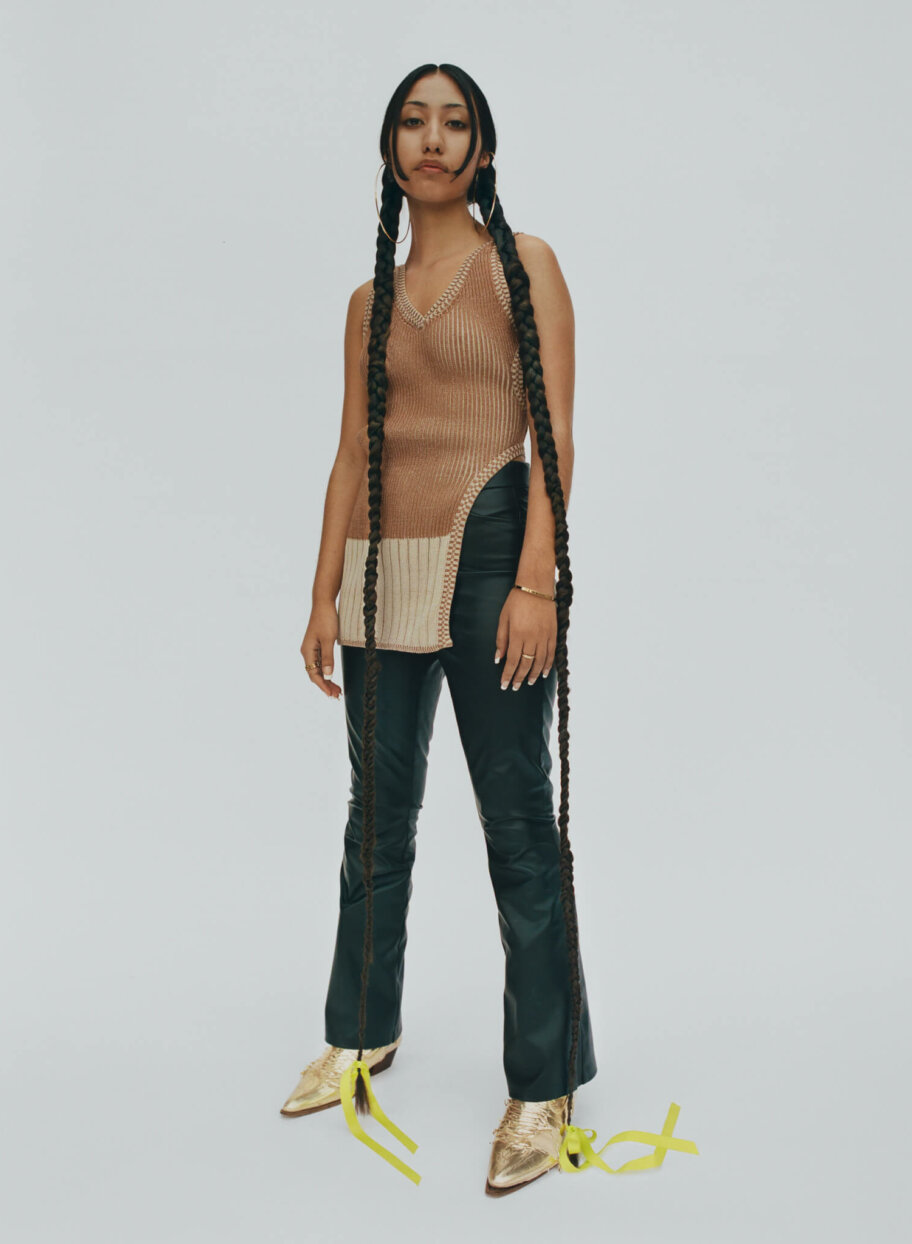
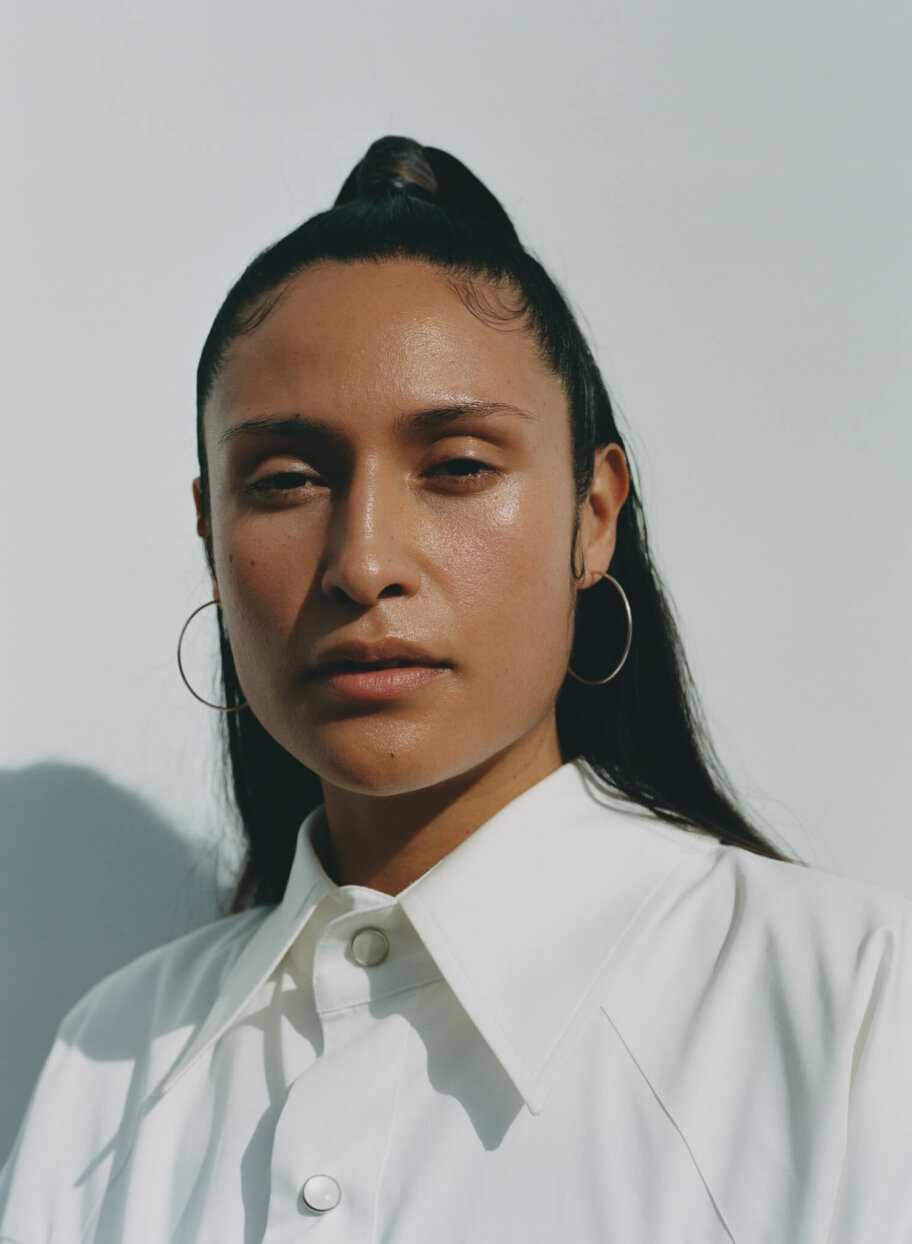
This whole thing is wildly interesting to me, how a 19-year-old from Mexico City with a background in architecture and a bedroom agency, so to speak, was getting her people on covers in Europe. “I think it’s so important for me to start from the beginning so I can paint the picture of how hard it was to get the local industry to understand the opportunity of working with different models and amplifying and changing the meaning of what a model was at the time.” She talks about how grateful she was for the interest from these brands coming from other countries, but at the end of the day, she was left with a lingering feeling of disappointment understanding that her own country did not first open its arms for her. When I understand the difference between the representation that Maria was, and is, fighting for in her own country, and the representation that BIPOC are fighting for here in the states, perspective seems to shoot through me like a shock. As minorities in America actively fight an ever present majority for a piece of the pie, the majority in Mexico are being controlled by a monster of their own making, who doesn’t even live among them.
“I guess those in charge thought that portraying people that looked like most Mexicans, and not foreign models with Eurocentric features, wouldn’t keep their brands alive. Maybe at the time it was kind of crazy to imagine something different, but I didn’t care. It was just so unbelievable to me that nobody questioned anything. It was just happening and people were working around it, especially in fashion. Everyone, from the stylists to the photographers to the artists, were just working with models that looked the same, and looked nothing like what the actual standard in Mexico was. At some point it seemed impossible to not speak on it. I actually still have a copy of this Mexican magazine that I used to read where this booker from a Mexican agency was doing a review of her trip to Paris fashion week. I remember that she was reporting on how beautiful all the models were, and how hard it was to be a model because you have to do this and that, but then she said “the only models that I saw in Paris fashion week that were Mexican, had the fortune of not looking Mexican. A look, that at this time, is not fashionable at all”. The fact that she said this in a Mexican magazine and signed her name, and it was revised and edited and proofread and still ended up in my hands, made me positive that this wasn’t on anyone’s radar.”
People always say that greatness is born out of necessity, but I couldn’t imagine finding myself in her reality, constantly seeing beauty represented in a form so different from her own, and still having the strength to push back.
“Before I started this agency, I was interested in fashion as a consumer. I read the magazines that I had access to and was constantly finding references on Tumblr and stuff, but I was young and almost didn’t question the completely foreign white presence in it all. I thought that was what beauty and success looked like. The “it girl” culture was so big at the time, but it was so far from me. I knew I wasn’t that and would never be. It almost felt like this wasn’t my conversation, but then I thought… Why? Why don’t I have someone that looks like me in fashion? And, at the end of the day, it’s not even just about fashion at all. Media is everywhere. You walk to the corner store and there’s an advertisement, Instagram, social media, everything. I knew that if I was consuming this as someone with a passing interest in the industry and feeling this way, there were others out there that felt it too”
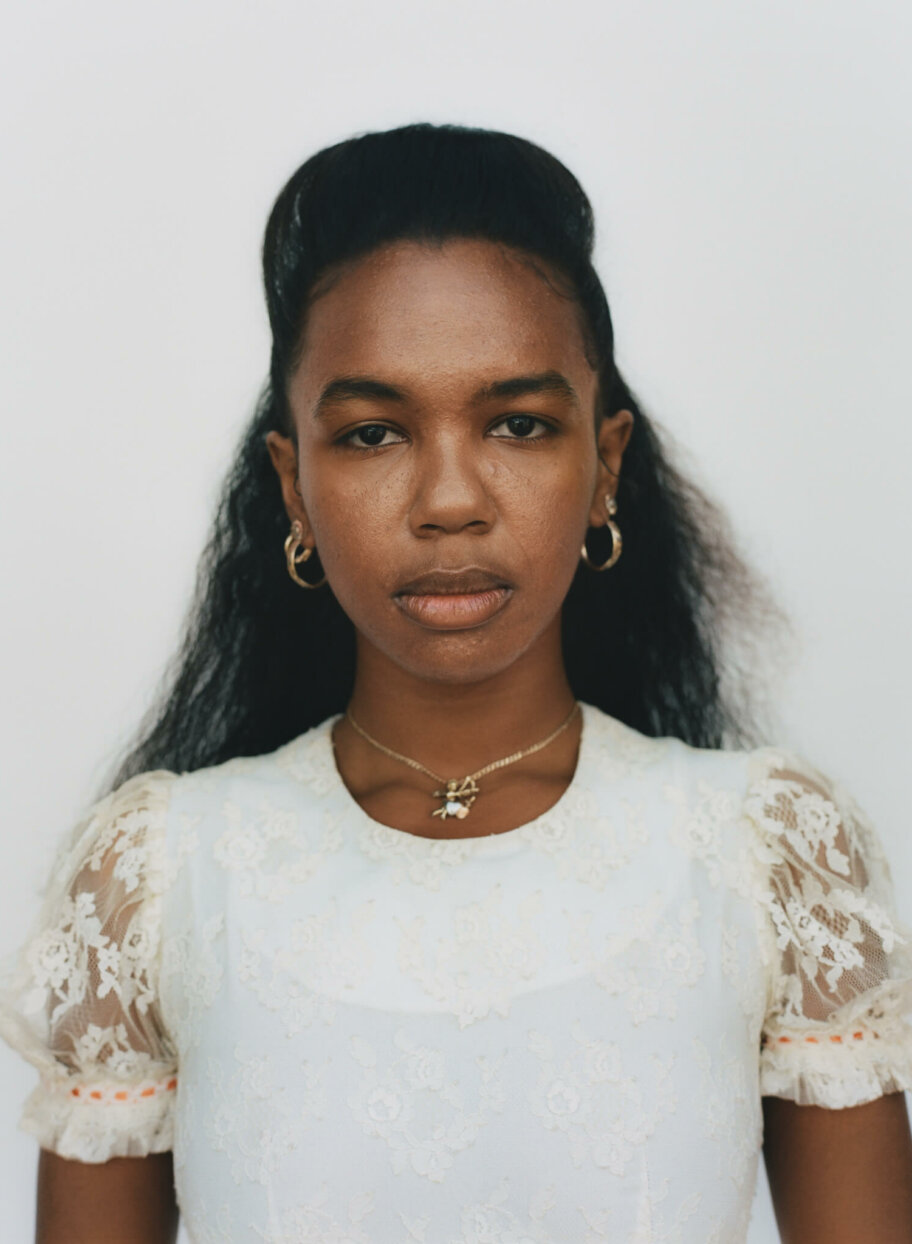
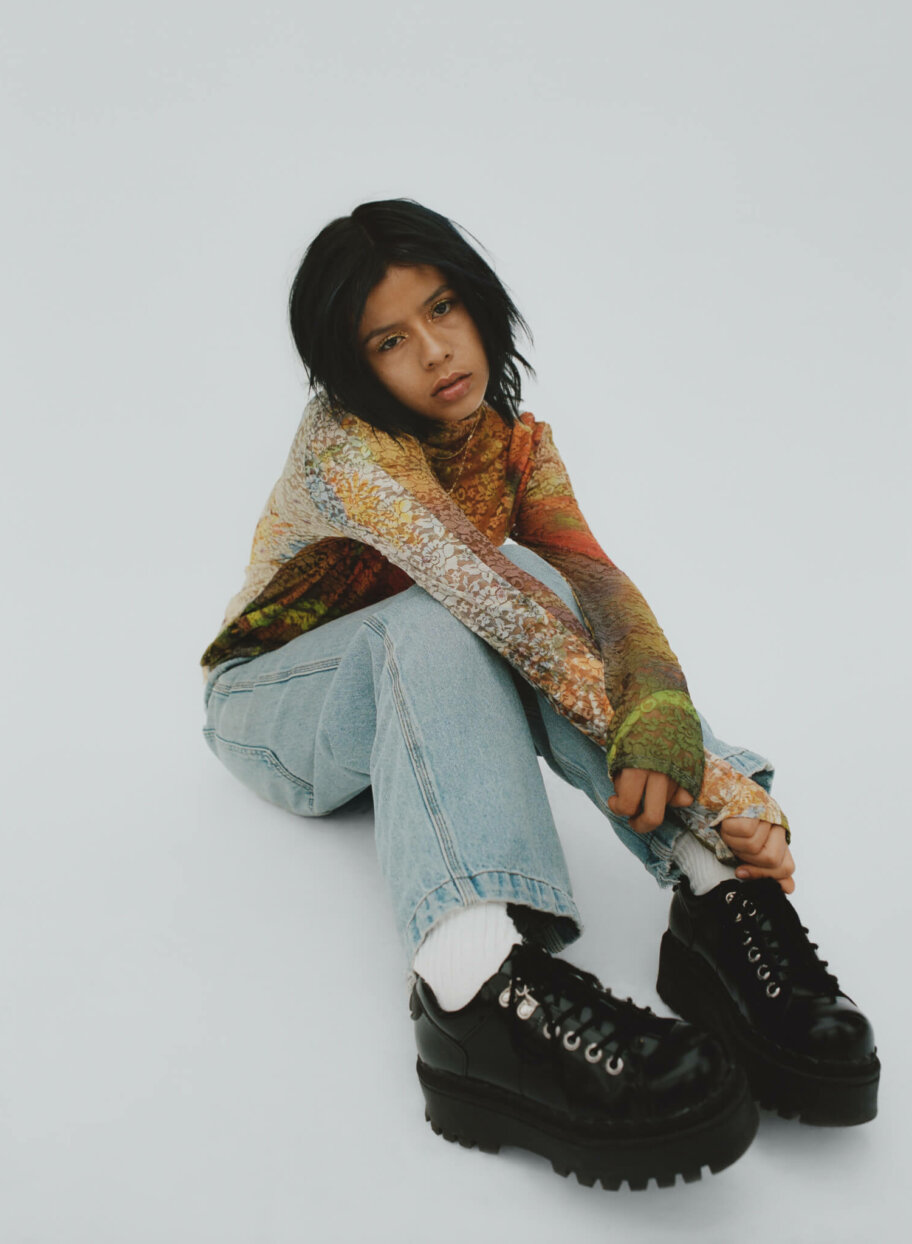
Her desire for representation is so strong and so evident, I can’t help but remember that she’s spent the last six months in the US, witnessing one of its biggest fights for representation and change. As I sit on the floor, I think back to the summer of 2020, and revisit the feelings of pride and respect in my fellow man while we protested and had hard conversations in support of black lives. I also remember the many fights that took place with loved ones or strangers who somehow weren’t seeing eye to eye, and the many times I would have to disconnect and take a second just to push through it all. Leading the fight for representation in Mexico City, and then being thrust into America’s summer of pure destruction and hate, must not have been easy. When I ask her how she navigated that landscape as a minority, she takes a shaky deep breath.
“The movement comes from a place that all minorities have to understand. Obviously, our histories are completely different, our vulnerabilities and situations are different, but it’s important to see that. It’s important to see why every community deserves to be listened to at different times. I read that other communities and minorities were trying to talk about their own struggles during this time and they would be shut down, because it was a time to hear and understand black lives, and I completely agree with that. I also think that this movement almost woke people up from this white narrative, and that’s something all minorities are affected by because most of the time, if not every time, power means white. What we as minorities need to do is find our voice. We all need to talk about these vulnerabilities that we go through as minorities, talk about what they mean, find the common denominator, and figure out what the next step should be. For me, it’s more about being conscious of the differences, but also trying to find a place where we can meet and work together to achieve bigger things. Division is always something used by people in power to stay in power, but we are not enemies. Now that I am in the states, the conversation is wider. In Mexico, there’s colorism there, the lighter your skin the higher your power, and there are problems with representation, but there aren’t as many groups and history’s in one same place like there are here. It’s really important for me to understand where I’m standing. Yes, I want to talk about Mexico and Latin America, but I need to understand what is going on right now around me, find out who are the other people that are underrepresented, and try to help them as well. Even though focusing on Latin America might be easier for me to connect to, I’m not trying to divide and assume that is my only fight. I come from Mexico, and I can’t just erase my history and try to run away from it, but learning from and living with these many different realities must happen.”
“We have to lift each other up. I think it’s amazing every time I can hear someone else’s story, or I can meet someone who comes from a different situation. Even for Mexicans. This is something really important for me because yes, I grew up in Mexico, but I know my experience is completely different from Mexican immigrants who grew up in America with Latin American parents. I want to hear from these people because my story is not greater than theirs. I want to know how it felt growing up, trying to be 100% more Mexican for Mexicans and 100% more American to not be excluded from this place. It’s so important for me to keep listening and learning.”
After she finishes, there’s a kind of pause and silence in between us, and then I laugh. All I can say is “wow, you’re so awesome”. Because she is, and because what a year it’s been, and what an outlook on life. And because she’s still going. I ask her what she would tell someone who has no hope. She says you need to see past yourself, and utters these words… “Sometimes when I feel hopeless”, and I sigh. She struggles, she’s human, and look at all she’s done. It is possible. Her advice, as I’ve come to realize over the course of this call, is on the money as always.
“I always remind myself that I’m not the one responsible for the world’s atrocities, and that there are problems much bigger than mine. I think finding mi comunidad más cercano de impacto, the people right next to me, is my lifeline. They can be related to me or be complete strangers because reaching out to someone right next to you who might be hopeless, and sharing and connecting with them might seem hard, but will make you both feel like a part of something bigger. When I thought I was the only one who didn’t belong, it sucked. But I put this thing together, and I put it out there, and now look. I came to realize that I can’t change the things I want to change, really. Not in the speed that I want, or the terms that I want. In this industry there are people that just take your narrative when it’s convenient and then move to the next page, but what is important is being able to have those conversations. To feel like you can sit down and say “hey, I know what you’re saying!” or maybe like “hey, I don’t know what you’re saying, but I want to understand you.”
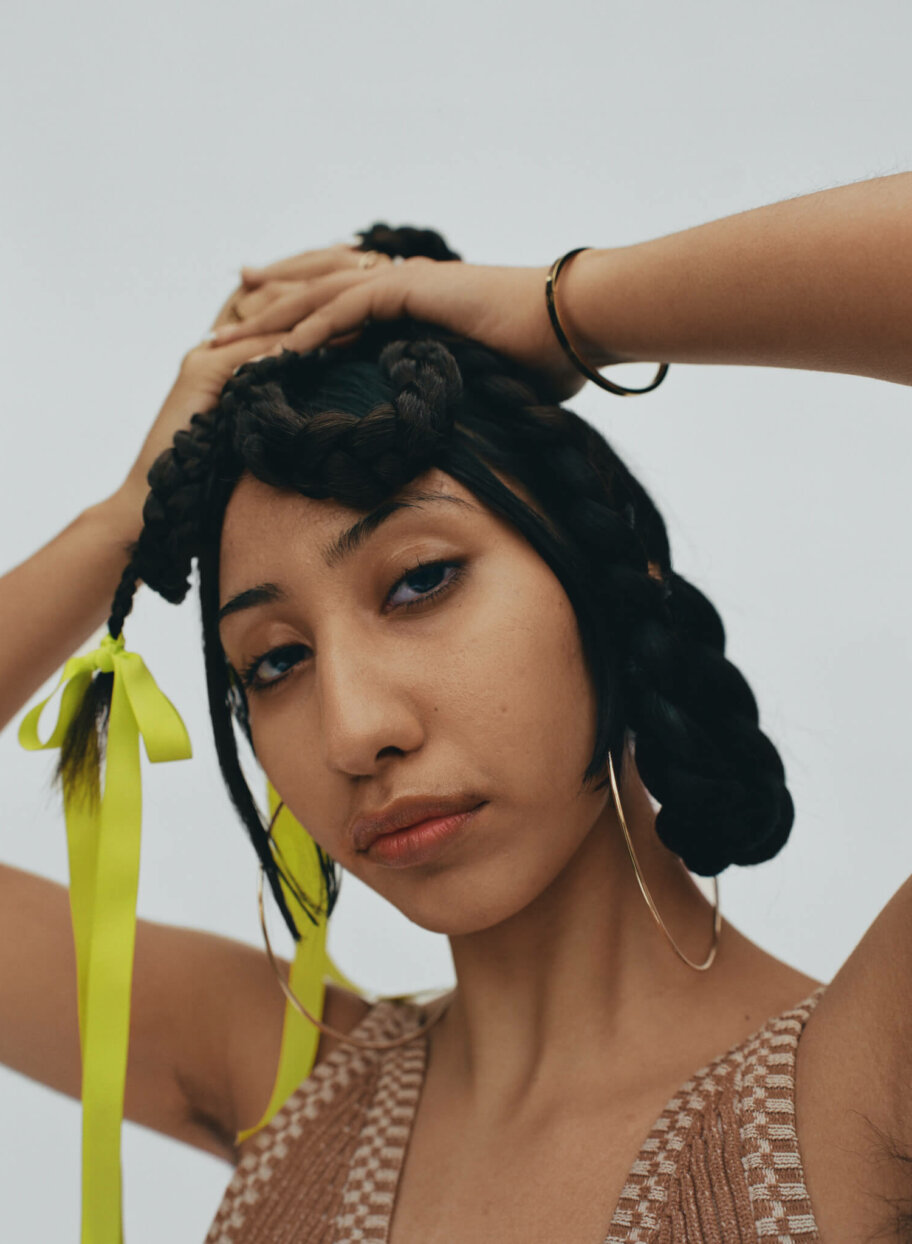
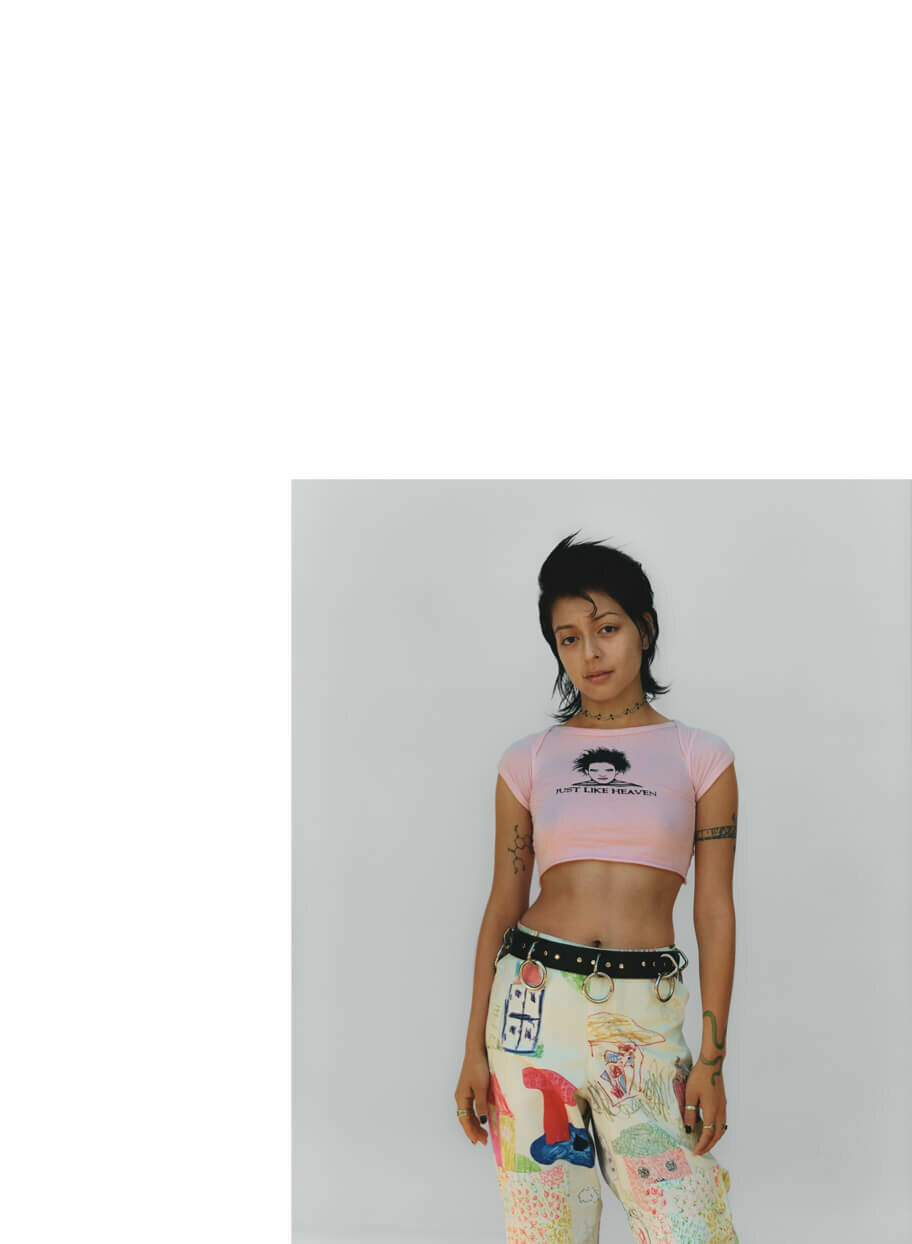
She tells me that her favorite thing from the early stages of the project was that instead of booking jobs, she would get dozens of emails from kids expressing their empathy for the project, and understanding that it was so needed. Her take away? She is frustrated with herself because she can’t give everyone jobs. Her internal monologue of the need to do more and push herself for others is so apparent. I almost feel like we are sitting across from each other. She wants to help, but at the end of the day she’s just one person and the job comes with a lot of hard realities that must be shared with someone she believes in, but that not necessarily everyone else does. Nevertheless, casting is what has gotten her this far, and she’s so grateful for the discipline, but she wants to grow.
“Long long picture, I want this project to go even further than fashion and create a cultural conversation. If it’s an educational space, or whatever I can do to bring people together, then that’s what I want to be doing.”
And then, something happens. She begins to speak about her models, and reflects on the fact that she is the one that has brought these people together. Regardless of the fact that she has been saying she wants to do more during this entire call, she takes a moment to recognize the fact that she has changed 20 peoples lives. That these people that she cares about would not have met, or been able to sit down for dinner together if it weren’t for the project, and she starts to word vomit. She admits that she is sad. That when this project started, it was going so well and she thought she would be able to reach so many. Now, she doesn’t know.
“I came with a very easy idealista perspective, dreaming of doing a lot, and it was amazing because I was unstoppable. But it only lasts for so long. It’s been a hard year, and with all these racial movements around the world, I’ve been mentally shut down. The industry I work in is also very performative most of the time, and my job is just the cover of the book. People think that if they get a diverse cast for the cover then they’re good, but no. That’s not enough. It’s not just about how good it looks, it’s about how you go about it. What is the internal structure.”
She tells me that many times this year, she has thought about giving up, but that conversations like this one make her want to keep going. We both laugh at ourselves for being so emotional in the shared space of 1,000 miles. In this time, it’s just so refreshing to be able to speak to someone who deeply resonates with you, despite having completely different backgrounds, past, and futures. In a way, it feels like our small talk taking place in a bathroom in Florida, and an apartment in Brooklyn, is proving all the bigots wrong. The conversation shifts into one of renewed hope and plans for the future.
“I was really excited to get this interview, because the last one I had was before the pandemic, and I feel like I was standing in a very different place than I am standing in now. It’s not that I don’t want to keep doing what I do, it just needs to be more radical. I don’t mean that it has to always be uncomfortable for other people, but more challenging, not as digestible. In fashion, it’s something we’ve come to accept. It’s like “put this here, but don’t talk about it and it’ll be enough for everyone to understand what our vision or stance is” and it should be deeper. I’m not expecting for everyone to always be talking about the things that are uncomfortable or sensitive, but if we can remember that we are all humans and we all have personal experiences that we can connect to other people, that might be more relevant for people to be reading and consuming. It might be the thing that makes people get involved. That’s what I want to do. I was honestly a little scared for this shoot at first because the deck was all about Chicano culture. Obviously I love to talk about Mexicans who live in the US, but it’s not my experience. If we were going to do a feature on me, I didn’t want it to be centered on that. Not because I don’t celebrate it, but because I wanted it to be wider than that. I want to include as many backgrounds as I can because that’s what I want people to see. I didn’t want people to see a story about the Mexicans that have one specific aesthetic, because it’s about Mexicans, and non-Mexicans, and all Latin American communities. If you just look at New York, Latin American communities are a third of the population, and who is talking to them? No one.”
As she’s speaking to me, I realize that the disparity in representation that is happening in Mexico isn’t as far from home as I thought. The only difference is that representation in America is a multi million dollar market, and they don’t want to lose out. But what’s worse? Pushing an image of beauty that isn’t a daily reality, or pushing diversity for profit?
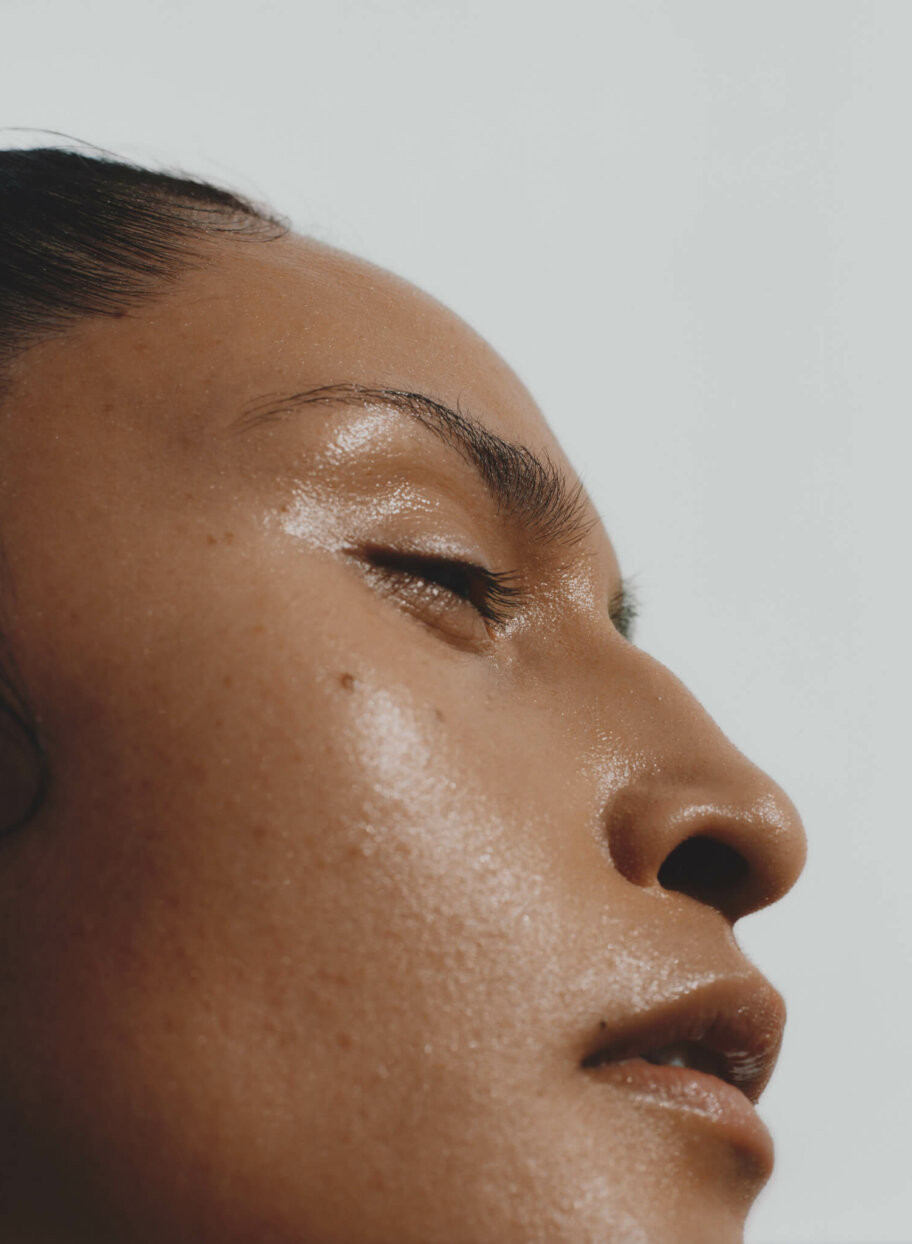
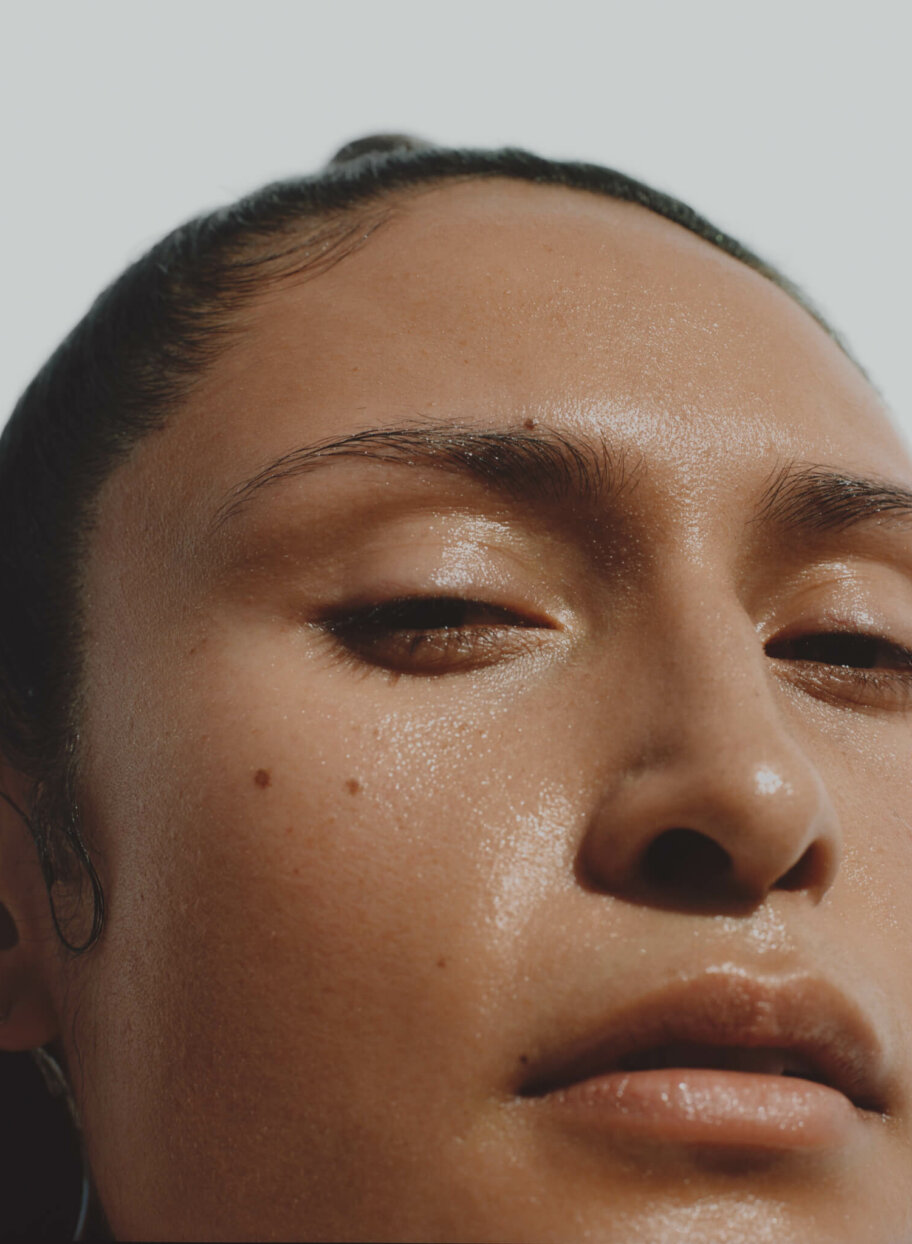
I tell her that it’s super fucking shitty that she’s the one that has to navigate her anger. She can sense my frustration and she laughs, but it pisses me off that as a minority, she is having to approach these non-minorities in a way that doesn’t make them uncomfortable.
“You know, it does suck, but at least people here care a little bit. They are more aware of that here than in Mexico. In Mexico, people don’t care, which is impressive. They all claim to be Mexican, but the boss is always a male white Mexican. They love to say “we are all Mexican” but I’m like, wait a minute. We might have the same passport, but we have completely different life experiences. It’s a really hard conversation there. Even when the black lives matter movement happened, a lot of people were posting black squares but not recognizing the racism that they exercise as Mexican citizens.”
A story my friend once told me, that has always stuck with me, seems to fit perfectly and I tell it to her. My friend was taking in a refugee family for some time, and at the beginning, she was apprehensive and nervous. Scared that they wouldn’t understand each other, that the language barrier would prove to be too great to form any kind of bond, but she was wrong. My friend was a mother, and so was this refugee woman. Despite their different backgrounds and language barrier, they knew what it was like to give birth, to raise a family, to struggle. What’s important are these shared experiences that we all go through no matter where we are or what we look like. Womanhood, motherhood, love, pain, we have all felt those things. We all have a common denominator.
We’ve been talking for a little over an hour now, and even though I think I have an idea of what she’ll say, I still want her words. I ask her what beauty means to her, and she dives right in.
“That’s a good one, because I’ve been trying to get as far as I can from using that concept. I guess beauty is something that we’ve overrated as a concept that rules our vision over many things. We try to fit everything into it. At the beginning of my career in this modeling and casting world, I was trying to redefine beauty by making a wider concept that could include not only other races, colors, and forms, but also backgrounds. Now, I’m trying to get rid of it. I don’t know how beauty suits the world I want to live in and the things I want to do. Is it relevant? I don’t know, I don’t think so. There are always going to be standards that are going to be hard to get away from when working in fashion, but I want to deconstruct it more. I want to be more open about people you can connect with outside the visual part. What about a great story? That’s beautiful. What about connections? That’s beautiful too. What about shared experiences, and talking about yourself, having a platform for being your own person. Maybe that’s what I think is beautiful.”
Who is Maria Osado? Other than fighting for representation, who is she at home, when no one is there? What does she like, what makes her laugh, smile, cry, what makes her human?
“That’s a hard one. I think I’m a person interested in human connection. I am a person interested in meeting new people who share a wider vision. I want to live in a world where we have many different realities, and we can still respect each other and listen to each other. I am a very funny, ultra sensitive, curious person. I have a lot of love. I haven’t hated someone in such a long time. I do hate some situations and dynamics, but as something that I put my energy into, I guess I’m a very committed person with the things I decide to engage with. Sometimes I’m very lazy, there are barriers that I have that sometimes stop me from getting stuff done. I’m fun, funnier in Spanish than in English, but yeah. I’m just a human.”
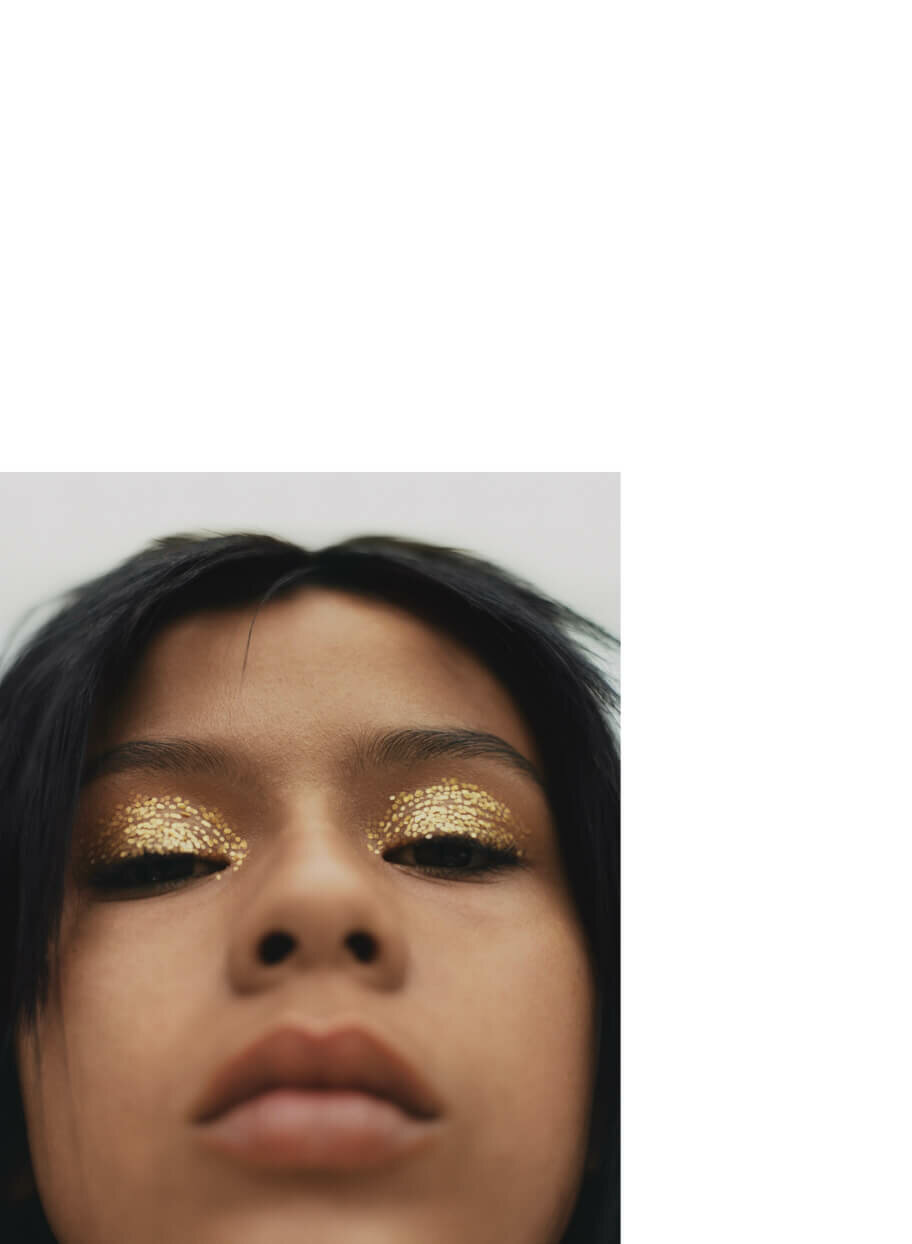
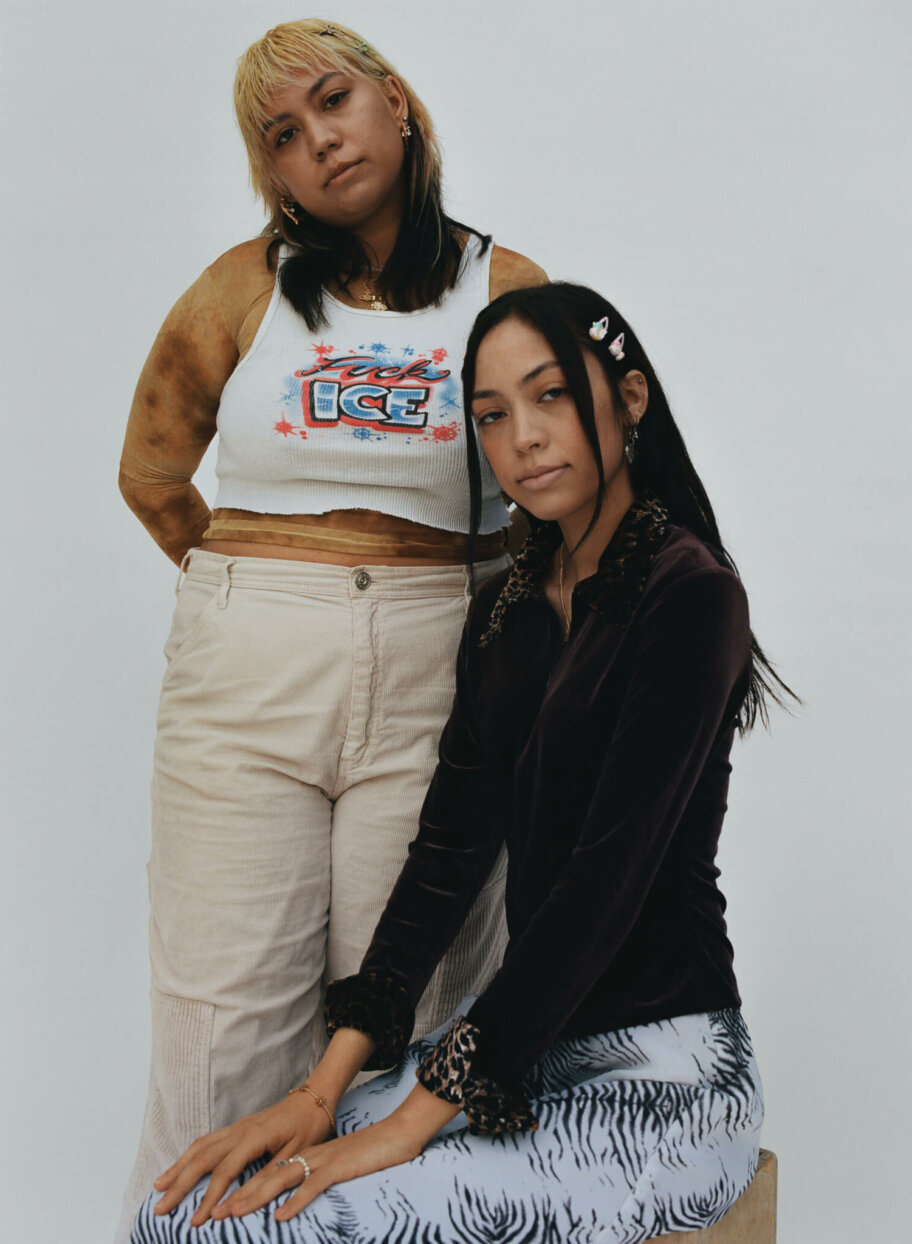
Can you tell me a bit about your background and your relationship with representation? Did you grow up feeling or seeing people who looked like you in any field and did you ever feel affected by it?
Our background is Mexican-American. Our immediate family grew up in La Puente, California and we eventually moved to the SG Valley in our later life. Our dad’s family migrated from Tonaya, Jalisco (next to Guadalajara) in the ‘70’s so we’re both third generation.
E: As for representation, I remember growing up feeling extremely confused with my identity and the culture that I came from. I never saw any Latinx/Chicanx/Latin American individuals being represented in any super exposed magazines/films/or photos and this hindered me psychologically. Even the area I grew up in, I was always the distinctly different one. It was difficult not really having an outlet and being constantly shown the perfected image society wants you to mirror. There was a lot of self doubt and hatred towards the distinct facial features I possessed or having a fuller body compared to the images of skinny light skin toned womxn I saw daily in the media. And when Latinx culture was represented it was usually done sexually which left a lasting effect on who I was portrayed as towards others. Consistently being catcalled and disrespected while doing something as mundane as grocery shopping really left an impact on my Mexican culture and had me asking what was wrong with myself. It wasn’t till I was in adulthood when I really came to terms with my true self and respected, loved, and appreciated the family I come from.
I: Growing up it has been a struggle to love my body hair. As a Latina woman, it is quite prominent and noticeable even at a young age. It was always deemed as unpleasant on a woman and I would go above and beyond to make sure it was unseen in public settings. It was never common to see a strong, sexy Latina woman who would showcase her natural body hair.
What does beauty mean to you?
E: Beauty can take on so many diverse roles and mean many different things to everyone. Being a photographer, I think I learned about beauty in an unconventional way. I learned to love and appreciate through a lens and therefore I always found beauty in anything I shot. Beauty essentially to me means being at absolute completeness with one’s self.
I: Beauty to me is a means of empowering yourself. It is a mindset in which one appreciates those qualities of yourself that set you apart and make you feel comfortable in your own skin.
What do you hope to see moving forward in the fashion industry and in media in regards to representation and diversity?
E: I hope to see more fluidity and the individuals that inspire me take up space and create art. I know so many beautiful artists, photographers, models, and other talents that deserve to have their time in this industry. I also wish that no other children grow up the way I did, hating body hair, my curves, and my Latinx heritage. I’ve missed out on so many opportunities to deepen my culture appreciation and now am just making up for lost time
I: I hope in the future to see more women in the fashion industry and media that look like ourselves and can say “Oh, that looks like me!”. To see people with different cultures, skin types (acne/textured), and body shapes in mainstream media will reinforce that we all have more in common than not. But most importantly, I want to see more art of brown people made by brown people.
Can you tell me a bit about your background and your relationship with representation? Did you grow up feeling or seeing people who looked like you in any field and did you ever feel affected by it?
I’m a first generation Guatemalan womxn born and raised in Los Angeles, CA. I grew up in the mid/late 90s and early 2000s, so my point of reference for other Latinx figures was so limited. I would get the classic “you look like Eva Longoria or JLo” which I simply knew WAS NOT true (literally on so many levels ha) especially because I come from Mayan heritage but popular culture had such limited exposure to Latinx representation, let alone any understanding of how diverse the Latin Diaspora actually looks like. I would confusingly take the compliment but get so angry because it felt so reductive— like my entire existence could only be held up to two actresses that white people would deem as exotic. Because I never felt anyone looked like me in mainstream media, I really thought I needed to be tall, skinny and blonde to succeed in life. It has taken me about 12 years to unpack this and begin my process of my physical self acceptance. Looking back, media was pretty crazy for the POC experience in the early and mid 2000s.
What does beauty mean to you?
This is such a deep personal question to me since I work in the beauty industry. As a practitioner, I literally am fueled by the idea of making people feel good internally and externally. For years, I had reduced beauty to physical appearance— how my hair looked, my skin, and cool makeup, but every year as I get older this definition not only expands but has drastically evolved into a more encompassing meaning based on character, authenticity and intention. Ultimately, beauty is being unapologetically yourself and living in your most authentic form, whatever that may look like to you. I’m 30 now and have never felt stronger and more beautiful— I have a new found strength and confidence in myself that revolves around being vocal, authentic, and proud of my Guatemalan heritage and indigenous lineage.
What do you hope to see moving forward in the fashion industry and in media in regards to representation and diversity?
I want to see more inclusion although I do think there has been slow significant progress. I’d love to see more self-identifying femmes and the black and brown trans community on some magazine COVERS— its TIME. I want to see the disabled community represented, and I want to see more curves and chunky bodies everywhere. And of course more and more indigenous representation and dark-skinned people in media because the world loves to rest on toxic structures of Colorism that is very much alive in the Latinx community. There is much work to be done but I see communities and people growing stronger on the daily…so yes, I’m motivated and ready.
Can you tell me a bit about your background and your relationship with representation? Did you grow up feeling or seeing people who looked like you in any field and did you ever feel affected by it?
Growing up, the world my parents fabricated to believe was in their best interest molded my mind and gave me a distorted perception of my existence. It was a world where my ancestral roots were unfortunately painted over with an extra-thick, American coat. Living my days more American than Peruvian, I was left feeling uncertain of my place in this world, accompanied by a misconceptualized notion of beauty.
Experiencing my first wave of anxiety this confusion brought me at a young age, I immediately found comfort in translating the unspeakable to the art of fashion. Finding this path of representation inevitably led to me experimenting and discovering my sexuality, where I found myself enjoying an androgynous behavior at the age of 10.
Going to the grocery stores with my mom, I never really saw women like me on the covers of magazines, brown with a hint of masculine femininity. If they were brown, they were hypersexualized and over-feminized, and if they were presented as androgynous, they were never brown. This intensified my uncertainty in where I fit in the world of beauty. I would go days asking myself, “am I really beautiful?”
What does beauty mean to you?
In my eyes, beauty is anything that reminds us of the true infinite origin of the nature of existence. In a very real sense, beauty is synonymous to consciousness–the more conscious we are that we are creatures created by an incomprehensible creator, the more perfect the beauty is that we perceive. The more beauty we perceive, the more beauty we project, and that is what is most beautiful in this world. “As above, so below, as within, so without, as the universe so the soul.”
What do you hope to see moving forward in the fashion industry and in media in regards to representation and diversity?
I’m optimistic that the fashion industry will continue its direction of representation toward a redeveloped notion of beauty. 10 year old girls will be able to walk by magazine stands that reflect what they see in their future: a successful and accepted woman worthy of the spotlight that does not fall under the hyperfeminine Eurocentric standard of beauty, but falls everywhere outside of that. I will live to see this industry reincarnate the meaning of beauty, to see it destroy and reawaken the soul of fashion.
Can you tell me a bit about your background and your relationship with representation? Did you grow up feeling or seeing people who looked like you in any field and did you ever feel affected by it?
I am Mexican and Guyanese. I grew up surrounded by white people in the early 2000s United States, so I didn’t really see a lot of people who looked like me unless I’d visit my cousins, or travel to where my parents were from, but even then I’ve always been in between. I wasn’t light enough to be what a lot of people thought of as mixed, I didn’t have the features to be considered black enough to some people. So it was just uncomfortable not fitting into any groups. These days for me personally it’s much easier to fit into my identity, I think the internet and the slowly changing media representation is showing us that people look different within every ethnicity and race.
What does beauty mean to you?
Beauty to me, is being able to look as were born and be proud of it. Being able to look how we choose and being proud of it. Being able to see love in our appearance, to love ourselves, to be loved, to be celebrated in our appearance however we are.
What do you hope to see moving forward in the fashion industry and in media in regards to representation and diversity?
I would like to see true representation, not just Eurocentric beauty standards regurgitated onto faces of color. In the past a lot of the people who were allowed to represent black and brown people were people who were socially acceptable to the white gaze. I feel like we’re moving into a place where people can come in different colors, shapes, heights, textures, and still get booked and highlighted. I’d love to see more of that, because in real life we all look different. The media portrays it like we shouldn’t, and even if we’re in a variation we have to fit a certain type to be worthy.
Can you tell me a bit about your background and your relationship with representation? Did you grow up feeling or seeing people who looked like you in any field and did you ever feel affected by it?
Si, cuando tenía 14 años solía ver en la colonia en donde vivía a dos chicas diferentes a las demás personas, quizás las veía diferentes por la ropa que usaban y sus peinados ellas eran un poco mas grandes de edad que yo, me llamaban mucho la atención quería conocerlas y después de un tiempo las conocí, se convirtieron en mis mejores amigas y me introdujeron a un mundo distinto de la música, arte, nuevos amigos, viajes y nos encantaba bailar psychedelic trance.
What does beauty mean to you?
Cuando pienso en belleza pienso en belleza interna y externa en belleza Natural, en Pureza en Sabiduría.
What do you hope to see moving forward in the fashion industry and in media in regards to representation and diversity?
Belleza Natural y Pura, nuevos movimientos relacionados al arte y a la música!
| Cookie | Duration | Description |
|---|---|---|
| cookielawinfo-checkbox-analytics | 11 months | This cookie is set by GDPR Cookie Consent plugin. The cookie is used to store the user consent for the cookies in the category "Analytics". |
| cookielawinfo-checkbox-functional | 11 months | The cookie is set by GDPR cookie consent to record the user consent for the cookies in the category "Functional". |
| cookielawinfo-checkbox-necessary | 11 months | This cookie is set by GDPR Cookie Consent plugin. The cookies is used to store the user consent for the cookies in the category "Necessary". |
| cookielawinfo-checkbox-others | 11 months | This cookie is set by GDPR Cookie Consent plugin. The cookie is used to store the user consent for the cookies in the category "Other. |
| cookielawinfo-checkbox-performance | 11 months | This cookie is set by GDPR Cookie Consent plugin. The cookie is used to store the user consent for the cookies in the category "Performance". |
| viewed_cookie_policy | 11 months | The cookie is set by the GDPR Cookie Consent plugin and is used to store whether or not user has consented to the use of cookies. It does not store any personal data. |